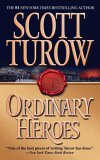Book Club Discussion Questions
In a book club? Subscribe to our Book Club Newsletter and get our best book club books of 2025!
For supplemental discussion material see our Beyond the Book article, and our BookBrowse Review of Ordinary Heroes.
Please be aware that this discussion guide will contain spoilers!
The questions and discussion topics that follow are designed to enhance your
reading of Scott Turow's
Ordinary Heroes. We hope they will enrich your
experience of this mesmerizing novel and the frontlines it brings to life.
Courts of law have set the stage in each of Scott Turow's bestselling books.
With
Ordinary Heroes, Turow introduces an attorney who is operating in a
new setting and period—on the killing fields of World War II's European theater,
under highly unusual circumstances. A JAG lawyer assigned to a case in which the
enemy may prove to be his own government, with no law office and no research
library, David Dubin is ordered to bring a fellow soldier to justice.
Ordinary Heroes is narrated by Kindle County journalist Stewart Dubinsky
(whom readers may recognize from some of Turow's previous novels) and by
Stewart's father. Stewart discovers an unexpected chapter of family lore after
the death of his father, David Dubin, who Americanized the surname that Stewart
later reclaimed.
Through wartime letters, military archives, and eventually the notes for a
memoir that Dubin wrote in prison, Stewart pieces together the secret history of
his father's clandestine actions, which led to his court-martial. Unfolding
through the eyes of father and son, the truth becomes a tantalizing mystery for
readers to solve.
Stewart had always believed that his parents met when Dubin rescued his future
wife from the horrors of the Balingen concentration camp. Stewart's research
will lead him to a very different truth; he will discover that his father was
there not as a liberator but to serve a warrant for the arrest of a wayward OSS
officer named Robert Martin. Dubin had pursued Martin and his seductive cohort,
Gita Lodz, through a series of daring escapades. Despite Martin's spectacular
bravery with the French Resistance, Dubin's superiors think Martin is a
Communist sympathizer.
Marked by high-caliber suspense and stirring dilemmas that capture the essence
of love and war,
Ordinary Heroes is a novel rich with topics for your reading
group.
Discussion Questions
- Discuss the effect of the V-mails on the book's opening pages. What was it
like to
read David Dubin's eyewitness account through the "artifacts" that comprise
much
of the rest of the book? Do father and son have different perceptions of life
in Ordinary Heroes?
- In chapter two, Dubin writes about his reasons for enlisting. What were
his true
motivations in going to war?
- What are Dubin's initial impressions of Staff Sergeant Bidwell? How does
Biddy's
perception of racism compare to Dubin's perception of it, both before and
after
Biddy makes his revelations about racial passing? What common ground do the
two
men share?
- How did your impressions of Robert Martin shift throughout the novel? Does
Brigadier General Teedle give an accurate description of him before Dubin
meets
him for the first time?
- How would you characterize Stewart's meetings with Bear Leach? How would
you have handled Stewart's requests if you had been in Justice Leach's
position?
- What did you make of Corporal Bonner's comments about Teedle's sexuality in
chapter eight? What would be the result of similar rumors in today's U.S.
military?
- Is Gita's allure purely based on sex appeal? How do her attitudes toward
men differ
from her mother's?
- In chapter ten, Gita reveals that her mother was killed for harboring Jews.
How
does Dubin respond to her after this scene? What does it take for him to
finally trust her?
- Chapter thirteen ends with Leach's recollection that Dubin feared his
children
would learn the truth about him. To what extent is it necessary to keep
secrets from
our descendants? To what extent is this harmful? Do you agree with the
Talmud's
aphorism, mentioned in the novel's first chapter, that a father should draw
his son
close with one hand and push him away with the other?
- How do the brutal December battles affect Dubin? How does he reconcile his
roles as legal assistant and soldier after these scenes? What does he mean
when he
tells Grace he regrets being a "soldier in earnest," in his letter to her at
the end of
chapter twenty-seven?
- What did it take to transform Gita Lodz into Gilda/Gella Rosner? When did
it
become her dream to have an ordinary life?
- Was it unpatriotic of Martin to try to keep not only the Soviets but also
the
United States from securing knowledge of Germany's weapons of mass
destruction?
Were Martin's actions rational? Would you have let him escape?
- What is your understanding of the relationship between Gita and Martin?
What
does war teach Dubin about love? Would he have had much chance of a good
marriage
with Grace?
- How do Stewart's findings affect the dynamic of his family—his
relationships
with his sister and mother, and the memory of David Dubin?
- Scott Turow writes that although Ordinary Heroes is completely a work of
his
imagination, the initial inspiration came from his father, who was a field
surgeon in
Europe during World War II. What legacies of war exist in your family? What
stories
of heroism and mystery are part of your family history?
- What similarities and differences exist between Ordinary Heroes and
Turow's
other novels? From Turow's point of view, what are the makings of a hero?
Unless otherwise stated, this discussion guide is reprinted with the permission of Grand Central Publishing.
Any page references refer to a USA edition of the book, usually the trade paperback version, and may vary in other editions.
